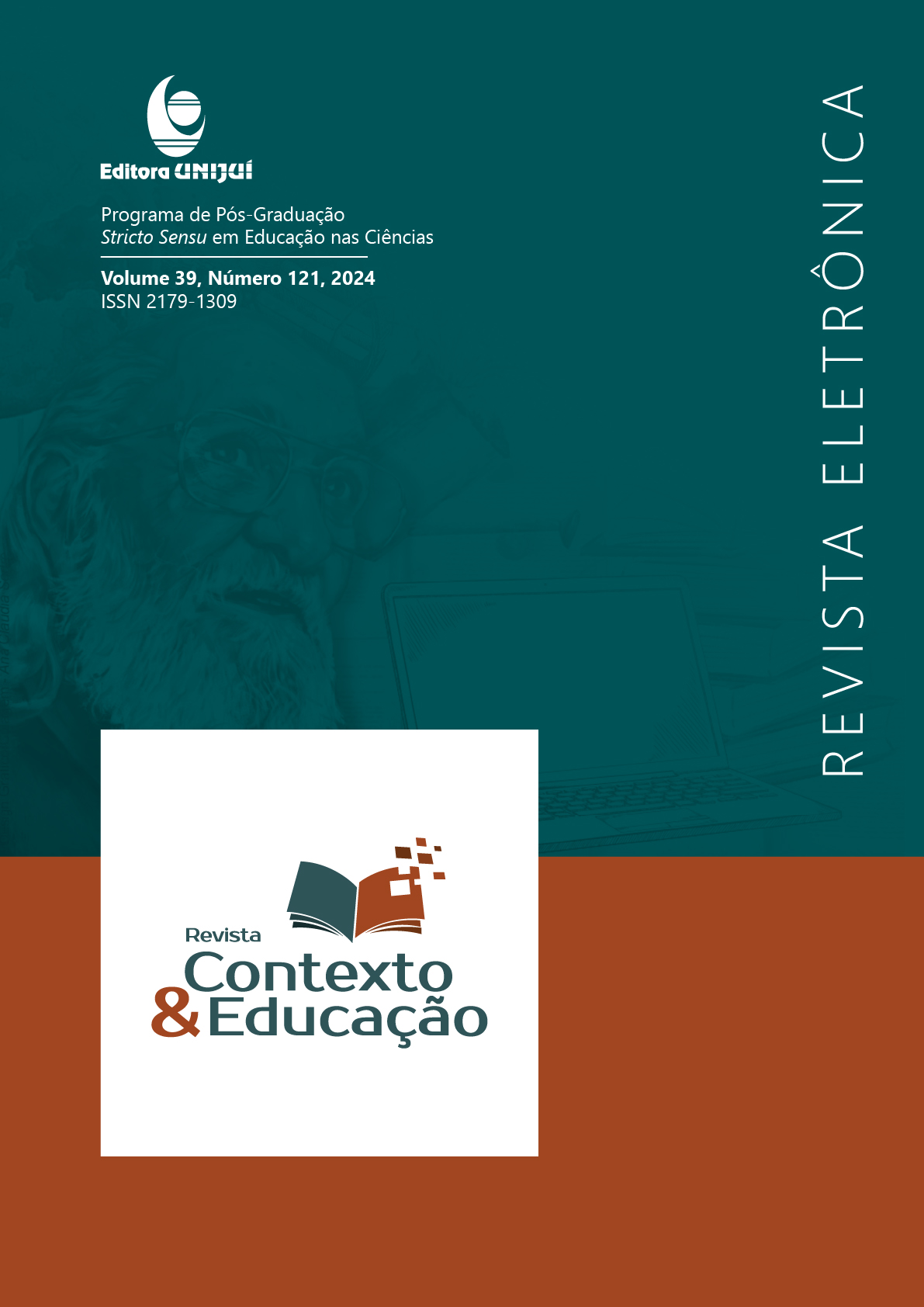Avaliação Formativa na Perspectiva de Professores do Noroeste do Paraná
DOI:
https://doi.org/10.21527/2179-1309.2024.121.15369Palavras-chave:
Aprendizagem, Avaliação educacional, Formação docenteResumo
A avaliação formativa consiste em um processo indispensável à aprendizagem, por se configurar pela regulação do processo de ensino, a partir de informações coletadas a respeito dos conhecimentos dos estudantes. Considerando a influência das concepções dos professores em sua prática pedagógica, o presente trabalho tem como objetivo caracterizar o relato de quarenta e nove professores a respeito da finalidade da avaliação no contexto escolar por meio de Análise de Conteúdo. Observa-se que trinta e dois professores fizeram referência aos elementos da avaliação formativa em sua explicação, sendo que a maior parte, representada por dezesseis, encontra-se no nível básico de compreensão, apresentando em seu relato referências à avaliação como parte do processo de ensino e aprendizagem, a alguma etapa específica da avaliação formativa, à autoavaliação, ao reconhecimento de dificuldades no processo avaliativo e aos objetivos de aprendizagem. No relato dos demais professores não houve referência a quaisquer elementos da avaliação formativa. Conclui-se que, para uma prática avaliativa mais coerente com os objetivos educacionais com vistas à formação global dos indivíduos, os conceitos, finalidades, instrumentos e sujeitos da avaliação formativa devem ser explorados de forma intencional e sistematizada na formação inicial e continuada de professores.
Referências
ANIJOVICH, Rebeca.; GONZÁLEZ, Carlos. Evaluar para aprender: conceptos e instrumentos. 1. ed. Buenos Aires: Aique Grupo Editor, 2011.
BARDIN, Lawrence. Análise de conteúdo. São Paulo: Edições 70, 2011.
BOGDAN, Roberto C.; BIKLEN, Sari Knopp. Investigação qualitativa em educação: uma introdução à teoria e aos métodos. Portugal: Porto Editora, 1994.
FURTADO, Cristiane; WIRZBICKI, Sandra Maria. Avaliação da aprendizagem: concepções e aspectos de licenciandos de um curso de ciências biológicas. Contexto e Educação, v. 37, n. 116, p. 403-420, 2022.
FREITAS, Luiz Carlos; SORDI, Mara Regina Lemes de; MALAVASI, Maria Marcia Sigrist; FREITAS, Helena Costa Lopes de. Avaliação educacional: caminhando pela contramão. 2. ed. Petrópolis: Vozes, 2009.
GIORDAN, André; VECCHI, Gerard de. As origens do saber: das concepções dos aprendentes aos conceitos científicos. 2. ed. Porto Alegre: Artes médicas, 1996.
IRALA, Valesca Brasil; BLASS, Leandro; JUNQUEIRA, Sonia Maria da Silva. Introduzindo o conceito de avaliação por rubricas por intermédio de oficinas: análise de uma experiência piloto. Contexto e Educação, v. 36, n. 113, p. 54-73, 2021.
LUCKESI, Cipriano Carlos. Avaliação da aprendizagem escolar: estudos e proposições. 22. ed. São Paulo: Cortez, 2011.
DOURADO, Simone; RIBEIRO, Ednaldo. Metodologia qualitativa e quantitativa. In: MAGALHÃES JÚNIOR, Carlos Alberto de Oliveira; BATISTA, Michel Corci (org.). Metodologia da pesquisa em educação e ensino de ciências. 1. ed. Maringá: Massoni, 2021. p. 14-34.
MORALES, Mariana; FERNÁNDEZ, Juan. La evaluacion formativa: estratégias eficazes para regular el aprendizaje. 1. ed. Madrid: Ediciones SM, 2022.
MORETTO, Vasco Pedro. Prova: um momento privilegiado de estudo, não um acerto de contas. 9. ed. Rio de Janeiro: Lamparina, 2014.
NICOLA, Rosane de Mello Santo; AMANTE, Lúcia. Rubricas: avaliação de desempenho orientada às competências na educação superior. Estudos em Avaliação Educacional, v. 32, e07582, 2021. DOI: https://doi.org/10.18222/eae.v32.7582
SANMARTÍ PUIG, Neus. Evaluar y aprender: un único proceso. 1. ed. Barcelona: Octaedro, 2020.
SANRMATÍ, Neus. 10 ideas clave: evaluar para aprender. 8 reimp. Barcelona: Graó, 2015.
SANMARTÍ, Neus. Avaliar para aprender. Porto Alegre: Artmed, 2009.
Downloads
Publicado
Como Citar
Edição
Seção
Licença
Copyright (c) 2024 Revista Contexto & Educação

Este trabalho está licenciado sob uma licença Creative Commons Attribution 4.0 International License.
Ao publicar na Revista Contexto & Educação, os autores concordam com os seguintes termos:
Os trabalhos seguem a licença Creative Commons Atribuição 4.0 Internacional (CC BY 4.0), que permite:
Compartilhar — copiar e redistribuir o material em qualquer meio ou formato;
Adaptar — remixar, transformar e criar a partir do material para qualquer fim, inclusive comercial.
Essas permissões são irrevogáveis, desde que respeitados os seguintes termos:
Atribuição — os autores devem ser devidamente creditados, com link para a licença e indicação de eventuais alterações realizadas.
Sem restrições adicionais — não podem ser aplicadas condições legais ou tecnológicas que restrinjam o uso permitido pela licença.
Avisos:
A licença não se aplica a elementos em domínio público ou cobertos por exceções legais.
A licença não garante todos os direitos necessários para usos específicos (ex.: direitos de imagem, privacidade ou morais).
A revista não se responsabiliza pelas opiniões expressas nos artigos, que são de exclusiva responsabilidade dos autores. O Editor, com o apoio do Comitê Editorial, reserva-se o direito de sugerir ou solicitar modificações quando necessário.
Somente serão aceitos artigos científicos originais, com resultados de pesquisas de interesse que não tenham sido publicados nem submetidos simultaneamente a outro periódico com o mesmo objetivo.
A menção a marcas comerciais ou produtos específicos destina-se apenas à identificação, sem qualquer vínculo promocional por parte dos autores ou da revista.
Contrato de Licença (para artigos publicados a partir de outubro/2025): Os autores mantém os direitos autorais sobre seu artigo, e concedem a Revista Contexto & Educação o direito de primeira publicação.


